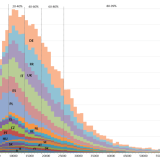
Dobro delujoči in vključujoči trgi dela
Dobro delujoči trgi dela so osnovni pogoj za popolno uresničitev vseh zmogljivosti gospodarstva za ustvarjanje delovnih mest po koncu finančne in gospodarske krize. Kriza je imela v državah članicah EU zelo različne posledice za trg dela, pri čemer je zlasti močno prizadela nekatere skupine, kot so mladi in nizko izobražene osebe. Hitre strukturne spremembe, ki se dogajajo, prinašajo tudi nove izzive, kar zadeva morebitna pomanjkanja delovne sile ter neusklajenosti v znanjih in spretnostih v različnih gospodarskih panogah in območjih.
Glavno orodje EU za spodbujanje zaposlovanja in socialne vključenosti je Evropski socialni sklad, ki je namenjen predvsem pomoči ljudem pri iskanju zaposlitve, vključevanju prikrajšanih oseb v družbo in zagotavljanju pravičnejših življenjskih možnosti za vse. Eno od orodij je tudi obsežna evropska zakonodaja, ki ureja pravice delavcev na trgu dela. Poleg tega je Evropska komisija aprila 2017 predstavila evropski steber socialnih pravic. Namen tega stebra, ki temelji na socialni politiki in politiki zaposlovanja EU ter ju dopolnjuje, je usmerjati politike na več področjih, ki so nujne za dobro delujoče in pravične trge dela in sisteme socialnega varstva.
- Evropska komisija: Evropski socialni sklad
- Evropska komisija: Evropski steber socialnih pravic





























